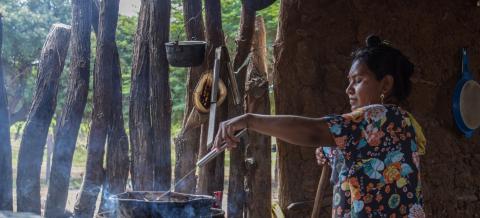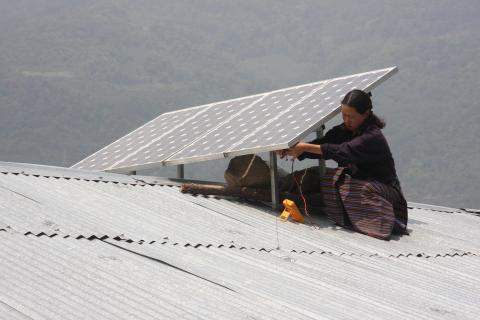
Nearly 200 participants gathered last month for a global, peer learning event on advancing gender equality in the extractive sector through EITI implementation.
While there is still a long way to go, the gender equality agenda is gaining momentum in the extractive sector. Last month’s event showed that there is strong interest across diverse stakeholders – including government, industry and civil society – to empower women’s participation in the oil, gas and mining sectors and to ensure that extractives contribute to the livelihoods of men and women in equal measure.
The event showcased diverse approaches to tackling gender inequality in the extractive industries – including from Afghanistan, the Dominican Republic, the Philippines and Senegal, among others. Here are four takeaways.
“Inequality undermines the goals of transparency, economic development, shared prosperity and political stability.”
– Elisa Peter, Executive Director, Publish What You Pay
Participants underscored the urgency of advancing gender equality to help achieve the Sustainable Development Goals. Tracking employment data by gender and occupational level can help guide policy reforms to promote gender balance in the sector. Reporting and research in the Philippines have shown that only 12% of the mining workforce in the Philippines are women, and that few women occupy leadership positions. In Senegal, women workers represented just over 8% of extractive sector employees in 2019 and were more exposed to negative environmental impacts.
According to Transparency International’s Accountable Mining Programme, corruption can impact women differently than men. For instance, women are more likely to be excluded from community consultations and subjected to sexual extortion. When negotiations for community development agreements only take place between men, such as male traditional leaders and male mining company officials, even despite a requirement for community participation, women are likely to miss out on the benefits from mining. More research is needed to better understand and prevent the effects of sector corruption on women and gender minorities.
Speakers further noted that the experiences of women are not homogenous, as those located in communities hosting extractive activities are less likely to have access to decision making spaces than women located in the capital.
“Deliberate efforts are needed to build the capacity of women to strengthen their voice and agency within EITI multi-stakeholder groups.”
– Talmika Hawiindi, Transparency International Zambia
In her keynote address, EITI Board Chair Helen Clark remarked that “better decision-making always flows from the full engagement of women”. In this vein, Afghanistan’s Minister of Mines and Petroleum Haroon Chakhansuri announced that his Ministry intended to employ women in over 500 positions at the central and provincial levels. He further noted that Afghanistan EITI has adopted a gender and inclusivity policy, and that four women were subsequently nominated to the country’s multi-stakeholder group (MSG) this year.
Participants recognised that transparency and multi-stakeholder dialogue are important enablers for women to participate in decision making and influence agendas in a meaningful way. Civil society groups in Zambia and Tunisia established more inclusive procedures for MSG nominations to help increase the number women members. Senegal’s Minister of State, Awa Marie Coll-Seck, noted that MSGs should engage with women outside the capital and involve women’s associations in the EITI process.
“We cannot manage what we cannot measure.”
– Anna Liza Bonagua, Department of the Interior and Local Development, the Philippines
The impacts and benefits of resource extraction are of interest to women, and gender data can serve as the building block for more inclusive policymaking. To this end, the EITI in the Philippines is developing reporting templates for government and company disclosures to include gender metrics beyond employment data, covering basic services and local content opportunities.
Research by the Natural Resource Governance Institute (NRGI) and the World Resources Institute (WRI) examined laws, policies and regulations on extractive industries that refer to gender in 12 countries. Very few included provisions for gender-disaggregated data collection or provided for quantifiable ways to assess progress with gender equality. However some countries, such as Sierra Leone, are placing more attention on the equitable division of opportunity in the natural resources sector and mitigation of the sector’s gendered adverse effects. While Sierra Leone is making progress on the policy front, NRGI shared a short documentary which highlighted some of the implementation challenges in turning policy into gender-transformative change. With regards to extractive contracts, gender advocates should also push for disclosures to ensure access to the protections that might be contained within and to highlight gaps that require improvements.
Without data, it is impossible to precisely know and understand the issues women in extractive communities are facing, and the actual barriers to their participation in decision making. Some participants suggested that policy and legal frameworks should include mandatory gender disclosures by companies on social and environmental impacts, and that all companies undertake gender impact assessments throughout the life cycle of extractive projects.
“Gender commitments in extractives should be developed in line with existing frameworks – such as the Open Government Partnership and the EITI – to push for greater transparency.”
– Aubrey Menard, Natural Resource Governance Institute
The event underscored the demand for peer learning and experience sharing across the global network. Participants emphasised the importance of partnerships and collaboration, and that EITI stakeholders should draw on experiences and expertise in the gender justice and open government communities. One of the experiences shared was from Oxfam, which has since 2019 been working in Zambia and the Dominican Republic to build partnerships between and bridge the advocacy agendas of women’s rights organisations and revenue transparency organisations, such as the EITI.
The EITI can play an important role in promoting more inclusive dialogue and approaches among all actors, including companies. Representatives from the International Council on Metals and Mining (ICMM) and International Women in Mining maintained that industry players can benefit from building resilient communities in areas where they operate.
Maintaining momentum ahead of the 2023 EITI Global Conference
With the energy transition expected to shape the future of extractives and of communities dependent on the sector, equal participation in decision making will be key in ensuring that the transition leaves no one behind. To sustain momentum, it will be important to regularly monitor progress in countries and document how EITI implementation is contributing to advancing gender equality.
Following an analysis last year on the implementation of the EITI Standard gender requirements, the International Secretariat committed to support countries in reaching two targets: that women make up at least one-third of representatives on MSGs and at least two-thirds of EITI implementing countries disclose gender-disaggregated data. The EITI will soon launch a second review on global implementation of the gender-related requirements of the EITI Standard.
This event was co-hosted by the EITI International Secretariat and the Gender Justice and Extractive Industries Working Group (Publish What You Pay, Oxfam, FEMNET, Natural Resource Governance Institute, World Resources Institute, Development Gateway, Transparency International Accountable Mining Programme). Special thanks to Alice Powell, Aubrey Menard, Maria Ezpeleta, Nicole Bieske, Stephanie Rochford and Rob Pitman for their contributions to this blog.
Useful links:
- Recordings of the event
- Analysis of baseline gender data (2020)
- EITI: Gender and extractive sector governance
- Guidance Note: Towards gender-responsive EITI implementation
- Webinar series: Radically Different: Gender Justice in Natural Resource Governance
- Feminist Natural Resource Governance to Herald a Just Transition: 18 policy imperatives, in English, French and Spanish
Photo by Sauda Fanny Jussa on Flickr



